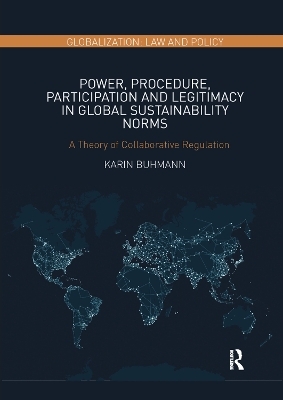
Power, Procedure, Participation and Legitimacy in Global Sustainability Norms
Routledge (Verlag)
978-0-367-27345-3 (ISBN)
Globalisation of the market, law and politics contributes to a diversity of transnational sustainability problems whose solutions exceed the territorial jurisdictional limits of nation states in which their effects are generated or occur. The rise of the business sector as a powerful global actor with a claim to participation and potential contributions as well as adverse impacts sustainability complicates the regulatory challenge. Recent decades’ efforts to govern transitions towards sustainability through public or hybrid regulation display mixed records of support and results. In combination, these issues highlight the need for insights on what conditions multi-stakeholder regulation for a process that balances stakeholder power and delivers results perceived as legitimate by participants and broader society.
This book responds to that need. Based on empirical experience on public-private regulation of global sustainability concerns and theoretical perspectives on transnational regulation, the book proposes a new theory on collaborative regulation. This theory sets out a procedural approach for multi-stakeholder regulation of global sustainability issues in a global legal and political order to provide for legitimacy of process and results. It takes account of the claims to participation of the private sector as well as civil society organisations and the need to balance power disparities.
Karin Buhmann is Professor in the Department of Management, Society and Communication at Copenhagen Business School. Her dedicated charge is the field of Business and Human Rights. Her teaching and research interests are in the areas of business responsibilities for human rights, Corporate Social Responsibility, sustainability and public-private regulation. She has published widely on these and related areas.
PART I: SUSTAINABILITY, TRANSNATIONAL ECONOMIC ACTIVITY AND REGULATORY CHALLENGES
Chapter 1: Introduction
Setting the stage
Objective, method, key terms and delimitations
Chapter 2: Regulatory Innovation: Non-State Actors and Sustainability Norms
Regulation companies in conventional international law
Regulatory innovation in theory: involving non-state actors in super-national law-making
Regulatory innovation in practice: Public, private and hybrid law-making for sustainability and business conduct
Corporate Social Responsibility, sustainability and governance needs
Actors, interests, and significance for the construction of norms on sustainable economic conduct
Chapter 3: A Multiple Case Study Representing a Diversity of Processes and Outputs for Business Conduct and Sustainability
Context: Juridification and international policy developments
UN initiatives on normative guidance on Business & Human Rights: From contestation and disagreement to deliberation and negotiated agreement
Multi-stakeholder hybrid initiatives for norms for business conduct: the UN Global Compact, EU processes and ISO 26000
PART II: LEGITIMACY AND PUBLIC-PRIVATE REGULATION OF TRANSNATIONAL SUSTAINABILITY CONCERNS
Chapter 4: Theoretical Perspectives on Participatory Law-Making, ‘Compliance Pull’, Communication and Legitimacy
Instrumental approaches to law
Legitimacy and ‘compliance pull’ in international law
Input, throughput, output and legitimacy: the deliberative turn in rule-making
Modernising international law: towards participation in super-national law-making
Chapter 5: Power, Privilege and Representations of Interests
Why collaborative regulation? Revisiting the roles of participation and power for output
Communicating for change: inducing self-regulation by speaking to the concerns and interests of stakeholders
Process, reflection and outputs
Participation, power and legitimacy
Outlook for collaborative regulation
Chapter 6: Proceduralisation for Legitimacy
Complementarity of reflexive law and deliberative law-making for legitimacy
Procedural design and process management
Procedure, trust and legitimacy
Summing up on findings before proceeding to the proposed solution
PART III: COLLABORATIVE REGULATION
Chapter 7: Foundations for Collaborative Regulatory
Scope of application
Proceduralisation
Procedural design and power
Towards constitutionalisation? A prospective treaty on participation, procedure and rights of non-state actors in super-national law-making
Chapter 8: Steps for Collaborative Regulation
Issues to be considered in a formalised process of collaborative regulation
Steps for proceduralisation in a specific case of collaborative regulation
Chapter 9: Summing up and Looking Ahead
Recapitulation
A condensed version of the theoretical basis, analysis, argument, and new theory
Looking ahead
Bibliography
| Erscheinungsdatum | 28.03.2019 |
|---|---|
| Reihe/Serie | Globalization: Law and Policy |
| Zusatzinfo | 2 Tables, black and white |
| Verlagsort | London |
| Sprache | englisch |
| Maße | 174 x 246 mm |
| Gewicht | 453 g |
| Themenwelt | Recht / Steuern ► Allgemeines / Lexika |
| Recht / Steuern ► EU / Internationales Recht | |
| Recht / Steuern ► Öffentliches Recht ► Umweltrecht | |
| Recht / Steuern ► Öffentliches Recht ► Völkerrecht | |
| ISBN-10 | 0-367-27345-4 / 0367273454 |
| ISBN-13 | 978-0-367-27345-3 / 9780367273453 |
| Zustand | Neuware |
| Haben Sie eine Frage zum Produkt? |
aus dem Bereich


